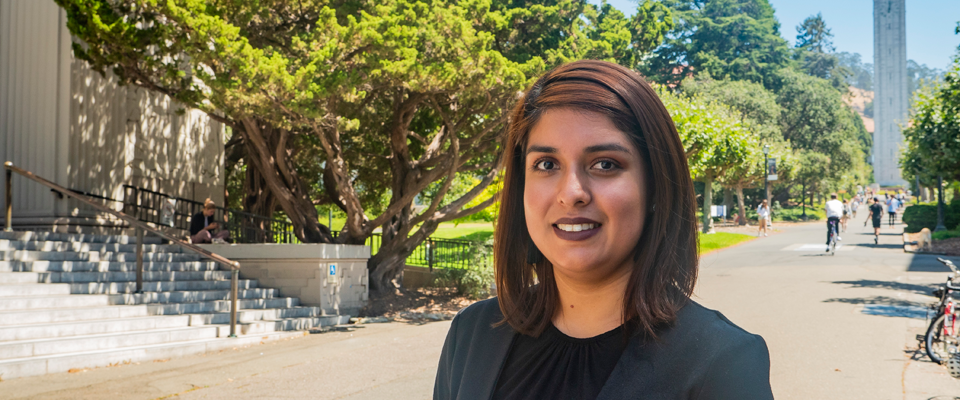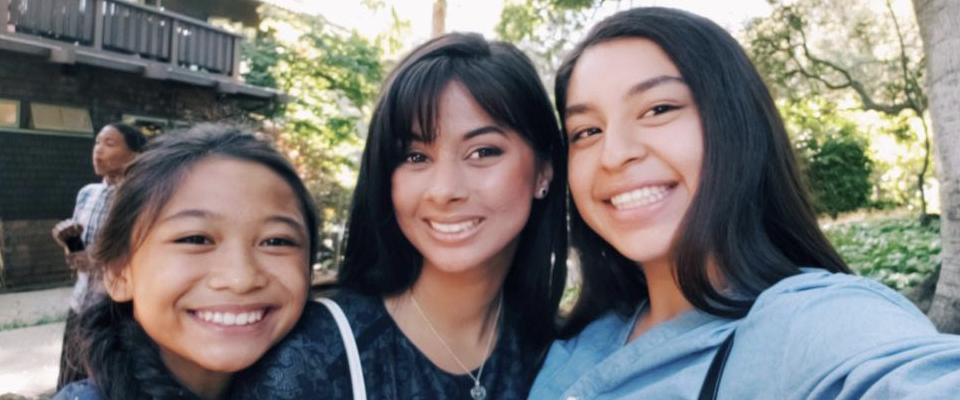People never expected much of Itzel Cortes Tena ’18 where she grew up, she recalls. She grew up in Salinas, California, a predominantly agricultural community where endless fields surround the center of town. Her mother works in the fields, and her father works in a packing plant.
Up through the 6th grade, Itzel’s school classified her as an “English learner.” While her peers studied science, Itzel was required to take additional English classes. “I was at a disadvantage,” she recalls, “but I didn’t let this drag me down. I always had that grit. I always wanted to go above and beyond.”
It wasn’t until high school that Itzel discovered how she could take that extra step. In an unpopular history class where most of her peers performed poorly, Itzel excelled. Itzel took her achievement as a sign that if she worked hard, she too could be successful.
“I knew I wanted to go to a four-year university. I didn’t really know how this college thing worked, and I didn’t think I would ever belong there,” Itzel explains. “I felt a lot of imposter syndrome.” At her high school, there was a large Latinx student population, but she was often the only Latina in her Advanced Placement (AP) classes.
Itzel didn’t learn about UC Berkeley until her junior year of high school, when she began meeting with an academic counselor and researching different colleges. “I wanted to attend Cal, but I didn’t think it was within my reach,” Itzel remembers. Her counselor encouraged her to apply to Berkeley, which she did—but she nearly accepted an offer from a different school before Cal even released its admissions decisions.
“My counselor kept telling me to wait [to hear from UC Berkeley] before making my decision, but I kept saying, ‘But I don’t think I’ll even get in!’” Itzel recalls. “I did end up waiting, though—and ended up getting into Cal, which I felt was a big accomplishment because it showed that I was as competitive as other students and fit into Berkeley’s rigorous environment.
“This is a real community, and they’re here for me.”
“Receiving The Achievement Award Program [scholarship] was the cherry on top,” she adds. For Itzel, The Achievement Award Program (TAAP) scholarship offered more than financial support: it promised a sense of community.
The transition from Salinas to Berkeley was terrifying and daunting. Itzel shares, “When my family left [after I finished moving into my dorm], I felt so lonely. I felt so lucky that TAAP had already reached out to me and connected with me before I even got to Cal.”
As an introvert on a campus as large as Berkeley’s, Itzel had worried about finding a community—until she connected with her peers in TAAP. At one of the first events she attended for TAAP, a TAAP Scholar retreat, she felt intimidated by the prospect of approaching the other students. But the older students and the Alumni Scholars Board members were welcoming. Itzel remembers thinking at the time, “This is a real community, and they’re here for me.”
At Cal, Itzel completed a double major in psychology and social welfare. She served on the Alumni Scholars Board as its Community Service Chair for two and a half years, during which she helped establish the TAAP Ambassadors Program. The program brings groups of TAAP scholars to local Berkeley high schools to speak with students about attending college and pursuing higher education. To this day, the TAAP Ambassadors Program continues to evolve.

Itzel still considers many of her TAAP peers close friends. Just as she turned to her fellow Alumni Scholars Board members during her bad days at Cal, Itzel sought out these same individuals for advice about her career path. After graduation, she began working at a startup, then moved to tech-education company Galvanize as a community coordinator. With the encouragement of her TAAP peers (and her supervisor), she pursued and landed a role she felt had been out of her reach: an enrollment officer who administers the company’s software and data science programs.
As an enrollment officer, Itzel registers students to Galvanize’s software and data science bootcamps. It didn’t take long for Itzel to realize the lack of diversity in these spaces and recognize herself in the small number of female students. “I try my best to provide additional support over the phone to the students who are more fearful,” Itzel explains. She knows she cannot make up an entire community, but she hopes to provide a support system similar to the one that TAAP gave to her.
Itzel has always sought ways to give back to others, but she credits Berkeley with reinforcing in her the value of giving back to her community and creating a support network around her. “Find your community, regardless of what it might look like,” Itzel says. “Berkeley teaches you that there are people out there who can help you, and who you can help.” For Itzel, those people are her TAAP family.




















